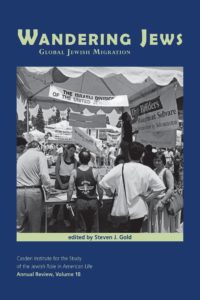Wandering Jews: Global Jewish Migration
Tue, March 30, 2021 3:30 PM - Tue, March 30, 2021 5:30 PM at via Zoom
Panel followed by book discussion of
Wandering Jews: Global Jewish Migration
Tuesday, March 30th, 4:30-6:30 pm | Register here
 Steven Gold will discuss his edited book Wandering Jews with Gil Ribak, Laura Limonic, and Kirsten Fermaglich, who will give virtual presentations on their chapters. Wandering Jews provides readers with a broader understanding of the Jewish experience of migration in the United States and elsewhere. It describes the record of a wide variety of Jewish migrant groups, including those encountering different locations of settlement, historical periods, and facets of the migration experience. While migrants who left the Pale of Settlement in the late nineteenth and early twentieth centuries are discussed, the volume’s authors also explore less well-studied topics. These include the fate of contemporary Jewish academics who seek to build communities in midwestern college towns; the adaptation experience of recent Jewish migrants from Latin America, Israel, and the former Soviet Union; the adjustment of Iranian Jews; the experience of contemporary Jewish migrants in France and Belgium; the return of Israelis living abroad; and a number of other topics. Interdisciplinary, the volume draws upon history, sociology, geography, and other fields.
Steven Gold will discuss his edited book Wandering Jews with Gil Ribak, Laura Limonic, and Kirsten Fermaglich, who will give virtual presentations on their chapters. Wandering Jews provides readers with a broader understanding of the Jewish experience of migration in the United States and elsewhere. It describes the record of a wide variety of Jewish migrant groups, including those encountering different locations of settlement, historical periods, and facets of the migration experience. While migrants who left the Pale of Settlement in the late nineteenth and early twentieth centuries are discussed, the volume’s authors also explore less well-studied topics. These include the fate of contemporary Jewish academics who seek to build communities in midwestern college towns; the adaptation experience of recent Jewish migrants from Latin America, Israel, and the former Soviet Union; the adjustment of Iranian Jews; the experience of contemporary Jewish migrants in France and Belgium; the return of Israelis living abroad; and a number of other topics. Interdisciplinary, the volume draws upon history, sociology, geography, and other fields.
Steven J. Gold is professor and graduate program director in the Department of Sociology at Michigan State University and is a faculty affiliate of the Serling Institute.
https://msu.zoom.us/webinar/register/WN_UtWj6t_dQdSnkiPx35kbsw
Kirsten Fermaglich – It’s the Community That We’ve Made: Jewish Migration to East Lansing, Michigan in the Postwar Era
This presentation explores the experiences of Jewish academics who moved to East Lansing, Michigan to take jobs at Michigan State University in the post-World War II era. These academics were part of a wave of American Jewish internal migration. As antisemitic restrictions lifted and higher education expanded in the years after the war, thousands of Jews moved from large Eastern cities to colleges located in small Midwestern and Southern cities with few Jews. Although Jewish observers at the time called these academics “runaway Jewish intellectuals,” fearing they would abandon the Jewish community, this paper will describe how the academic Jews of East Lansing found themselves seeking Jewish community, and indeed creating one that fit their needs. These academic migrants built their own religious school and synagogue, which featured an egalitarian liturgy, participatory worship service and a vibrant Jewish community. The academic Jews of East Lansing experienced a renewal, not a loss, of Jewish identity with their migration.
Kirsten Fermaglich is Professor of History and Jewish Studies at Michigan State University. She is the author of A Rosenberg By Any Other Name (NYU Press, 2018) which won the Saul Viener Prize for the best book in American Jewish history from the American Jewish Historical Society in 2019.
Laura Limonic – New Jewish Immigrants: Constructing an American Jewish Identity
Jewish identity is built within and across national borders – influenced by the transnational tenets of Jewish practice, faith and culture as well as the national cultures where Jews reside. Jewish immigrants often find that their Jewish practice and Jewish culture diverges from Jewish life in their adopted country. In this presentation, I compare three immigrant groups, from distinct geographic locations: the former Soviet Union, Israel and Latin America. By comparing demographic and socio-economic characteristics as well as markers of Jewish identity and behavior across these three immigrant groups, we widen our understanding of immigrant communities that comprise the larger US Jewish group. I use data from the Pew Research Center, to construct variables aimed at measuring Jewish identity – providing insight into the changing nature of Jewish identity and the process of assimilation into the larger US Jewish community.
Laura Limonic received her PhD in sociology from the CUNY Graduate Center in 2014. She has a Bachelor of Arts degree in Latin American Studies from Brandeis University and a Master of International Affairs degree from Columbia University. In addition to academic research, Laura has an extensive background in public policy research and advocacy.
Gil Ribak – Cleanliness Like That of the Germans: Eastern European Jews’ Views of Germans and the Dynamics of Migration and Disillusionment
The talk will focus on Eastern European Jews’ views of Germans before, during, and after immigration to America. Images of Germans should be understood in the context of the Jewish encounter with modernity. Modernizing Jews initially idealized the non-Jews whom they perceived as more developed and carriers of a higher culture; however, this pattern of initial admiration was frequently followed by disenchantment. Idealization required geographical distance; when Jews came into close contact with Germans, their attitudes often changed.
Gil Ribak is an Associate Professor of Judaic Studies at the University of Arizona. Born and raised in Israel, he came to the United States on a Fulbright Dissertator Fellowship and completed a doctoral degree in history at the University of Wisconsin-Madison. His book, Gentile New York: The Images of Non-Jews among Jewish Immigrants, was published by Rutgers University Press in 2012.

